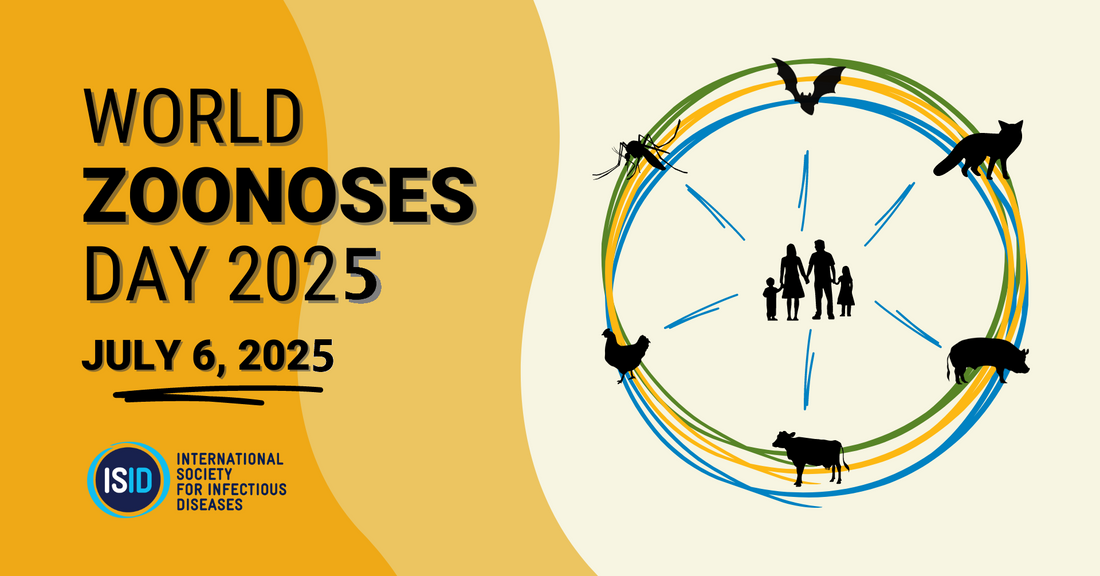
World Zoonoses Day
World Zoonoses Day is celebrated on July 6 to commemorate the first successful rabies vaccination administered by Louis Pasteur in 1885. Moreover, it raises awareness about diseases in the human-animal interface. More than two-thirds of emerging infectious diseases have their origins in animals. Examples of zoonotic diseases or zoonoses (diseases transmitted between animals and humans) include Zika virus, Ebola virus, avian flu, SARS, MERS, West Nile virus, Lyme disease, and yellow fever.
According to the Food and Agriculture Organization of the United Nations, 60% of all human infectious diseases have a zoonotic origin, and about 75% are transmitted between species. While zoonoses can be transmitted in many ways, one of the most common—and preventable—routes is through insect bites.
From mosquitoes to ticks, small pests have a massive impact on global health.
-
Mosquitoes are responsible for spreading malaria, dengue, West Nile virus, Zika, and more—causing over 700,000 deaths annually worldwide.
-
Ticks are major vectors of Lyme disease and other tick-borne illnesses, with cases rising steadily in North America and Europe.
-
Fleas can still transmit plague in some regions, reminding us that even ancient diseases can resurface.
As climate change and global travel make it easier for these pests to thrive, regions once considered low-risk are now seeing a surge in infections.
Bug Spray: A Simple, Effective Line of Defense
While vaccines, education, and public health programs are critical in managing zoonotic diseases, personal protection remains one of the most immediate and effective solutions. This is where insect repellent plays a vital role.
Look for repellents that contain EPA-approved active ingredients, such as:
-
DEET – Highly effective against mosquitoes and ticks.
-
Picaridin – Odorless and gentle on skin, yet powerful against pests.
-
Oil of Lemon Eucalyptus (OLE) – A natural alternative with proven protection.
-
IR3535 – Safe for the whole family, including young children.
How to Stay Protected
To reduce your risk of insect-borne diseases this summer and beyond, consider these easy steps:
-
Apply bug spray to exposed skin and clothing before outdoor activities.
-
Wear long sleeves and pants in wooded or grassy areas.
-
Check for ticks before going inside after spending time outdoors.
-
Remove standing water around your work zone to reduce mosquito breeding grounds.
Don’t Forget Indoor Protection: Bug Killer Sprays
While outdoor protection is essential, many pest-borne diseases begin right at home. Bug killer aerosols offer a fast-acting, indoor solution for killing disease-carrying pests like mosquitoes, flies, cockroaches, and even ticks that may enter living spaces.
These products are especially important in:
-
High-risk areas where mosquitoes may enter homes and breed indoors.
-
Regions with dengue, Zika, or malaria outbreaks, where even one mosquito can pose serious health risks.
When choosing a bug killer, look for:
-
Dual-action formulas that kill on contact and provide residual protection.
-
Non-staining, low-odor options for indoor use.
Pro Tip: Use aerosols as a complement to bug spray—not a replacement. While repellents protect you, aerosols reduce the source of the threat inside your environment.
At Nova Industrial, we’re committed to helping you work outdoors safely and responsibly. That's why, in honor of Zoonoses Day, we're offering 10% off our insect control collection. Deterrents, killers, and treatments, all discounted for the week surrounding July 6th*.
*Discount will run from 07/03/25 - 07/09/25.
#wetakesafetyseriously.
